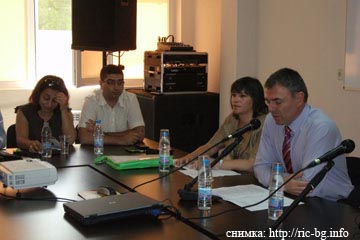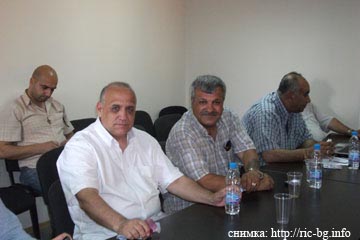13.06.2010Sergey Ignatov, Minister of Education, youth and science and Roma organizations discussed the draft of the Public Education Act
 The discussion between the Minister of Education Sergey Ignatov and non-governmental organizations working for the educational integration of Roma entitled “Discussion of the draft law on school education” continued more than three hours, instead of the previously set hour and a half. The meeting was held at the National training center for school principals in Bankya on June 12th. The discussion followed the National conference “The Public Education Act and the educational integration of Roma children”, organized by Center “Amalipe” on June 3rd in
The discussion between the Minister of Education Sergey Ignatov and non-governmental organizations working for the educational integration of Roma entitled “Discussion of the draft law on school education” continued more than three hours, instead of the previously set hour and a half. The meeting was held at the National training center for school principals in Bankya on June 12th. The discussion followed the National conference “The Public Education Act and the educational integration of Roma children”, organized by Center “Amalipe” on June 3rd in
The proposals by the expert group from Roma NGOs on the Public Education Act were discussed during the meeting. Among the main speakers were Minister Ignatov, Anelia Andreeva (Head of the working group drafting the Public Education Act), Asen Aleksandrov (adviser on school education matters), Deyan Kolev and Rumyan Sechkov (representatives of the expert group that drafted the proposals on the Public Education Act), Irena Mileva and Dimitar Kostov ( Principals of schools in Sofia and the village of Tishevitsa, District Vratsa). Statements were made by most of the other participants.
In his opening speech Minister Ignatov congratulated Roma organizations for their activity. “I insist wide circle of interested parties to take part in the preparation of the Public Education Act because education is really a priority. Let joint efforts to produce the law and also to implement it together!” the Minister said. He pointed out that a cardinal change takes place in Bulgarian education: it must become more adaptive and imaginative, more interactive, to be organized around the interests and needs of the child. The preliminary draft on the Public Education Actwill be the basis for such a change. It sets out several important things that are priority for the Ministry of education, youth and science: the introduction of full-time organization of the learning process, a requirement for compulsory pre-school education at the age of 5 (soon – at the age of 4), empowerment of school Boards of trustees, etc. “We are already working on them and with the changes in the current Law on education from this fall will introduce a full-time organization of the learning process for the first-graders (7.5 million BGN is secured for that) and the preparatory class for 5-year old children (9 million BGN is earmarked for that)”, Minister Ignatov said and added that his ideal view on education would be the one that would educate citizens rather than subjects.
In turn, Deyan Kolev said that the proposals to the Public Education Act he would present have been drawn not only by Center Amalipe, but a wide range of NGOs: practically all that have proven expertise in the educational integration of Roma children, as well as Roma experts employed at state institutions. These are consensus proposals for the whole Roma sector and in their preparation dozens of experts have been involved. Through them we support some of the major changes concerning all Bulgarian children: the introduction of full-day learning, two-year preparatory class, support for focal-point schools and removal of children without disabilities from social institutions for children with special needs by offering changes to make these processes more effective and sustainable, Mr. Kolev said. “At the same time we offer a few key things that are specifically designed to support the processes of educational integration of children from minority groups – those texts are needed, because the educational integration will not happen by itself, it requires investment of human and financial resources. In this aspect we suggest an explicit text for support of educational integration in Chapter 2 of the Act; introduction of state educational standard for intercultural and educational integration (Article 12); inclusion of texts that ensure education in ethnically diverse classes in villages and towns with diverse population and texts that support the implementation of intercultural education (the Chapters concerning pre-school and school education); introduction of financial support for the educational integration (the part “Financing of the educational system”). “We accept Minister Ignatov’s invitation to take part in drafting the Public Education Act and regulations – in particular the standard in intercultural and educational integration; even more, we insist on it!”, said Mr. Kolev as he officially handed the proposals to Minister Sergey Ignatov.
Dimitar Dimitrov, representative of Roma Education Fund for
The National Coordinator of the Decade of Roma Inclusion Milen Milanov underlined the problem of taking away Roma children without disabilities from schools for children with special needs. He gave an example from the town of 
Rumyan Rusinov stressed on the need for clear commitment to desegregation of Roma neighborhood schools. It is necessary to consider zero enrolment year in them to ensure free transportation from neighborhood schools to the so-called “accepting schools” and other measures in this direction. “We were disappointed by the fact that the original version of the draft law has nothing that aims at educational integration of Roma, but we are now encouraged by the signs that the proposals of the working group of Roma NGOs will be adopted and we encourage that”, said Mr. Rusinov.
Statements were made by the majority of those who were present. They brought up acute problems related to the education of Roma children: the need for raising the literacy of Roma adults, better qualified teachers to work in a multicultural environment, civil-society control over the quality of the learning process, clear parameters for the removal of Roma children from segregated schools in Roma neighborhoods.
“You convinced me that specific texts for educational integration are necessary in the Education Act and we will do it”, Minister Ignatov said at the end. The group of Roma NGOs experts will be invited to the meeting of the Working group of the Ministry of education, youth and science, preparing the draft law, and will also be able to develop the standard for intercultural education. “I am ready to organize other meetings on specific issues such as the removal of children from segregated schools. I have learned many things from you and that meeting and the dialogue will continue”, Minister Ignatov concluded in his closing speech.








